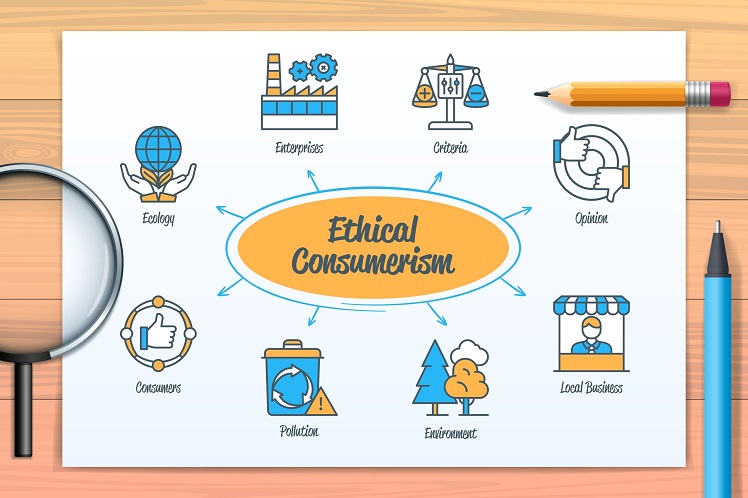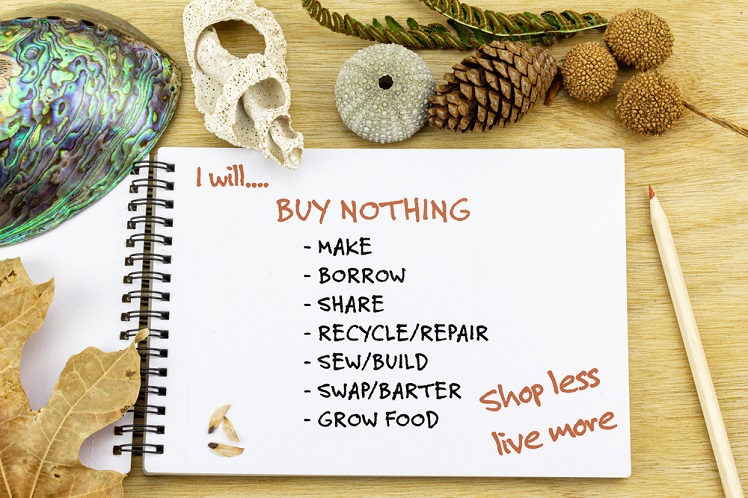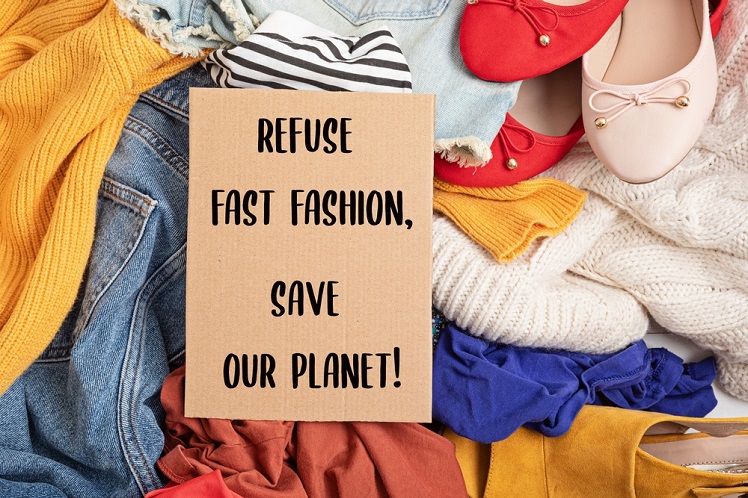The growing need for ethical buying of eco-products stems from the urgent need to combat plastic pollution and its harmful effects on the environment, including land and water degradation, and threats to human and animal health.
It is a known fact that plastic products are preferred due to their durability and affordability. However, the leading report states that almost 60% to 95% of the waste being produced contains plastic. Plastic is non-biodegradable and harmful to the planet. So, there is indeed a pressing need for ethical buying of biodegradable products to mitigate the effects of plastic pollution.
Even though getting a plastic product is more affordable as compared to eco-friendly products, the ground-reality shows a grim picture. Let us know about the clamor surrounding plastic products, its usage and why is there a need for ethical buying?
Key Takeaways
- Plastic pollution is severe, necessitating a shift to biodegradable, eco-friendly products.
- Ethical buying prioritizes products that minimize harm to the environment, people, and animals.
- Benefits of eco-friendly products include reduced energy consumption, less waste, and safety for all living beings.
- Ethical products support eco-conscious manufacturing, social responsibility, and local economies.
- Promoting ethical consumption involves educating consumers, valuing cultural respect, and encouraging sustainable choices.
Table of Contents
- What Happens When We Use Plastic Products?
- Why is There a Need for Ethical Buying of Eco-friendly Products?
- What Does Buying Ethically Mean?
- What are The Benefits of Ethical Buying?
- How Do You Create an Ethical Purchase?
- How Can You Promote Ethical Consumption?
- The Impact of Ethical Buying for Eco-friendly Products on The Environment
- Final Thought
- FAQs (Frequently Asked Questions)
What Happens When We Use Plastic Products?
Accumulation: A U.N report states that only 9% of the world’s plastic waste is recycled. The rest of the plastic waste gets accumulated in oceans, landfills and the environment posing a serious threat to humans, flora and fauna.

Here are some impacts that will happen after we use plastic products:
- Land and Water Degradation. Plastic is non-biodegradable. They take hundreds of years to decompose, which leads to contamination of water and soil.
- A Threat to Humans and Animals. Plastic breaks down into smaller particles known as microplastics. Humans consuming such food are vulnerable to health complications.
- Air Pollution During Disposal. Uncontrolled burning in the open air and careless disposal of plastics on land can release hazardous chemicals into the atmosphere and endanger the public’s health.
- Chlorinated Water. Chlorinated plastic has the potential to leak dangerous chemicals into the soil around it. These chemicals can then seep into nearby water sources, including groundwater, and the ecosystem. The species that consume the water may experience a variety of potentially dangerous impacts as a result.
All the above-mentioned effects impact the environment on a large scale reducing land productivity, increased plastic pollution and a less viable planet for humans.
Why is There a Need for Ethical Buying of Eco-friendly Products?
Choosing eco-friendly products will give some advantages to our environment. Since we want to protect the planet, we want to minimize the negative impacts by using eco-friendly products. Therefore, ethical buying of those products is essential.
Let us explain some reasons about the importance of ethical buying in the following points below.
- Biodegradable. Green products such as eco-friendly straws, cups and others are 100% biodegradable ensuring that land or water pollution is nullified.
- Eco-friendly Material. The primary materials used for manufacturing eco-friendly products are renewable and environmentally friendly.
- No Threat to Flora and Fauna. Since the green products consist of eco-friendly material, accidental consumption by animals or plants will have zero negative impact.
- Reduced Energy Usage. Plastic products require a higher amount of energy for manufacturing as opposed to less energy needed for green products manufacturing.
- Less Wastage. As compared to plastic products ending up in landfills or oceans, eco-friendly products can be used in compost heaps to improve soil fertility owing to green products biodegradability.
Adopting the Eco trends of sustainable and overall development of Mother Earth rests in our hands. It is high time that awareness on the need of ethical buying is promoted for the greater interest of the Planet.
What Does Buying Ethically Mean?
Purchasing things created without exploitation of people, animals, or the environment is considered ethical buying.
Moreover, buying things that were created ethically or that are not detrimental to the environment and society is what it means to be an ethical consumer. For example, simply buy eggs from free-range hens or ban products made with child labor.

Let us elaborate in more detail in the following points below.
1. What is Ethical Buying and Ethical Consumers?
The practice of buying goods and services produced in a way that limits social or environmental harm and avoiding goods and services that are thought to have a detrimental influence on society or the environment is known as ethical buying.
To be ethical consumers, people engage in it by purchasing ethically produced goods that assist small-scale producers or regional artisans, safeguard animals, and preserve the environment, while avoiding goods that use minors as slaves, conduct animal testing, or harm the environment.
Ethical consumers always have the ethical buying principle before deciding to buy something. In addition, they also play an important role by providing the demand for eco-friendly products in the market supply chain. By creating a sustainable eco-friendly economy, we can participate in creating a better planet.
2. What Makes Products Ethical?
The majority of the time, ethical products are very conscious of the concept that humans and the earth jointly shape the society we all live in. Here are some factors that make products ethical:
Eco-conscious
The product was created with consideration for environmental considerations. Where the company is actively taking steps to mitigate the environmental effect that they have made.
Examples: Utilizes renewable energy, makes donations to environmental charities, uses organic and cruelty-free products.
Socially Aware
Many businesses and brands are concerned about their employees and the community. They are taking action to guarantee that everyone is secure and content because they are conscious of their effect and are aware of it.
Examples: Fairtrade, No Child Labor or Sweatshops, Inclusivity, Diversity.
Locally Focused
This product combines eco-consciousness and social awareness by helping the local community while minimizing shipping and carbon offset for imported goods.
Examples: Helping locals affected by calamities, preserving traditional crafts, and assisting local suppliers
3. How Do You Identify Ethical Products?
In a world increasingly conscious of environmental impact and social responsibility, identifying ethical products has become a crucial task for the discerning consumer. Navigating the maze of green claims and eco-friendly labels requires a keen eye and a bit of know-how. There are two simple ways you can do to check for ethical products are:
Check The Certification Label
Many ethical products include certification stamps on the packaging that make it simple for customers to recognize them. A simple way to find ethical items is by looking for certification marks. When you shop for ethical products in the future, keep an eye out for the following marks:
- Fairtrade mark.
- Organic mark.
- Vegan label.
- Leaping bunny for cruelty-free.
- B-Corp.
- FSC.
Do Research From News and Internet
Usually ethical products always use the media to promote their eco-friendly products. Find news about these products regarding its environment campaign to make sure they have ethical buying principles.
You might also like:
- How to Start Sustainable Living and Eco-friendly Lifestyle?
- Green Environment – Its Significance for Mother Earth & Mankind
- Smart Sustainable Products
- 4 Excellent Eco-Friendly Products to Promote a Sustainable Future
- How to Save Mother Earth Before It’s Too Late? (Important Tips)
What are The Benefits of Ethical Buying?
Today’s consumers demand to know the origins and manufacturing processes of the goods they purchase. More people all across the world are adopting this increasing trend called ethical buying.
Due to this, ethical buying now plays a crucial part in the whole product sourcing process inside the supply chains of many businesses.

Here are some advantages of ethical buying you should know:
1. Environmental Sustainability
Customers are interested in purchasing goods that do not contribute to animal suffering, human trafficking, or environmental deterioration. In addition, customers are willing to pay more if a business sources its products in an ethical and sustainable manner.
By supporting this statement on your product, you will also create a sustainable environment. Therefore, you will gain more demand from these loyal customers.
2. Brand Boost
Enhancing the reputation of the brands is one of the advantages from ethical buying of eco-friendly products to a company.
Over two-thirds of American consumers and about a third of consumers worldwide prefer to purchase goods with an ethical sourcing. This is because ethical sourcing has a favorable effect on businesses’ overall sourcing management systems in terms of the environment and society.
3. Better Relationship Between Consumer and Manufacturers
This strategy promotes collaboration and participation in supply chains. A company can avoid being associated with exploitative activities by being aware of the origin of its products.
Consumers will become loyal as they get a guarantee from the source of material from the product they buy. When companies engage with local producers, retailers, growers, and farmers and actively contribute to the improvement of their communities, customer loyalty increases.
4. Save Money
Beside giving a “green” image to the company, supporting ethical buying can help them to save money. A company’s running costs can be significantly reduced by investing in a whole sourcing strategy that encompasses ethical sourcing of brands, goods, and services.
Making workplaces and manufacturing facilities more energy-efficient is a good place to start. You can improve insulation, use energy-efficient lighting, and get rid of production-related unproductive stages and processes.
5. Support Local Community
Local sourcing boosts the economy and supports sustainable manufacturing, as well as winning over clients and investors. So, an excellent option to protect the environment is to buy locally.
Buying materials from local producers is a great way to support a sustainable economy. In fact, buying from locals is actually cheaper than importing products overseas. In addition, businesses can lower their storage and transportation expenses and also reduce their energy use and emissions.
How Do You Create an Ethical Purchase?
More options than ever before are available to consumers today. When making a purchase, you may have to decide between two things. As buyers, you may need to take their moral and ethical principles into account.

In addition, making an ethical purchase is well worth it for the advantages it can provide to your neighborhood and the global community. The following are some actions you can do to make an ethical purchase:
1. Take a Part in ShopRaise
ShopRaise enables customers to make more ethical purchasing decisions by donating a portion of their overall sales to a nonprofit, team, school, or other charitable organization. These donations are made by the merchants, not the supporters. As a result, you can increase your giving without raising your spending.
2. Shop at Brands that are Ethical
Some companies prioritize using ethical products in conducting business. To ensure you’re buying from ethical brands, look for its certifications, check the news about the brand, if they have partnerships with any charity or not.
3. Buy from Local Producers
Supporting neighborhood businesses helps maintain a healthy and active local economy. Moreover, supporting local shops rather than national corporations might be a simple way to shop ethically without traveling far from home.
4. Buy Second Hand Products
Many perfectly good items are frequently donated to secondhand stores and thrift shops. Even while it may be alluring to purchase a brand-new model of any necessary item, purchasing an existing item is always more environmentally friendly.
5. Consider to Recycle
When making a purchase, consider its intended purpose as well as whether or not it will eventually be discarded. The entire life of a product, from its initial manufacturing to its eventual disposal, is taken into account when ethical buying.
6. Check Product Labels
Although surveys show that 68% of Americans are perplexed by the different labels and icons used to denote ethical items, understanding product labels can be a good way to make an ethical purchase.
So, consumers can choose products that are ethically sound by reading important product labels.
How Can You Promote Ethical Consumption?
There is a growing backlash against the notion that customers could affect change through their purchasing patterns now that the overall concept of integrating ethics and shopping has gained popularity.
So, the wide term “ethical consumerism” refers to businesses that offer goods that appeal to consumers’ better selves.

To make ethical consumption is easy to understand, here are some ways that your business can try:
1. Recognize and Value What Matters to Your Customers
Businesses must determine which moral problems matter to their customers and make sure they are happy with the company’s position on such topics.
Get feedback from your customers, since they can have some wonderful suggestions for improving your business and marketing strategies to more successfully attract ethical customers.
2. Respect for Culture
Expecting an ethical consumer program to boost sales is unrealistic, especially if your company’s ideals conflict with those of the ethical consumer. Because their corporate cultures encourage this kind of behavior in their workforce, companies like Levi Strauss and Johnson and Johnson are appealing to ethical consumers.
If their firmly held beliefs are involved in their purchases, consumers are more likely to be particularly brand loyal.
3. Educate Your Consumers
Customers typically don’t think they can make a difference, therefore show them how their purchase will make a difference.By informing consumers about your perspective and encouraging efforts, you may capitalize on their interest in topics that affect them.
4. Add Product Labels
Instead of being engaged ethicists, consumers are typically ethically passive customers. Since product labels are the main source of information for consumers, package layout and wording are crucial.
Customers are more inclined to make ethical purchases if they can identify additional advantages from the labeling.
The Impact of Ethical Buying for Eco-friendly Products on The Environment
Instead of for business and consumers, ethical buying on sustainable products also gives great impact to the environment. Here are some environmental benefits that will be created:
1. Lower Carbon Emission
You can lower your carbon emissions by using sustainable resources, such as renewable energy, or by purchasing products that consume less energy. According to the Anthropocene, carbon dioxide emissions from plastics made from corn, and sugarcane would be reduced by 84% and 86%, respectively.
2. Save Natural Resources
Since eco-friendly products are made by renewable natural resources (plants), you can reduce the usage of non-renewable natural resources (fossil fuels). Therefore, you can conserve natural resources by selecting goods and services that employ discarded or recycled materials as a source of raw materials.
3. Reduce Waste
Buying things that can be recycled or reused is one way to limit the amount of garbage that is sent to landfills. Enhancements to end-of-life situations for recycling and disposal are possible with biodegradable polymers.
This might make it easier on the environment and our current waste management methods.
Final Thought
In the end, ethical buying of eco-friendly products is important and should be promoted to the wider communities. This is a great way to support ethical business while giving the best quality to consumers, protecting nature, and creating a sustainable economy.
We hope this article will make you an ethical consumer on a daily basis.
Latest Post:
- Bioplastic Pros and Cons: An Unbiased Examination
- Eco-Friendly Bottling: Aluminum as the Sustainable Hero?
- How to Make Bioplastic from Rice: A Step-by-Step Guide
- Eco-Tips: How to Recycle Amazon Envelopes?
- What Does Compostable Mean?
FAQs (Frequently Asked Questions)
What do ethical consumers do?
The main goal of ethical consumerism is to select products that are developed, produced, and distributed in an ethical manner. Buying things that were created ethically and/or that are not detrimental to the environment and society is what it means to be an ethical consumer.
When enough customers conduct their shopping with ethics in mind, businesses may start to pay attention and change their supply chain procedures.
Why is it difficult to be an ethical consumer?
The price becomes the main consideration regarding being an ethical consumer. Since ethical products are still limited, usually they become more expensive than the conventional items.
This is really challenging since it entails consumers being inconvenienced, which is a tough sell to persuade people to support a cause.
Is ethical consumerism effective?
The awareness of ethical consumerism still needs to be improved. Because, it takes collaborations between consumers and producers to create a healthy supply chain.
Besides, the law makers also play an important role to make ethical consumerism effective. Regulation would, in fact, be a quicker and more effective way to address unethical consumerism than waiting for the market to reform.
Do consumers care about ethics?
Yes, they do! Consumers consistently act morally and care about it. The desire of customers to be able to uphold their values is strong. Therefore, emphasizing products in ways that appeal to a customer’s sense of morality has the potential to be a successful method of influencing customer behavior.
